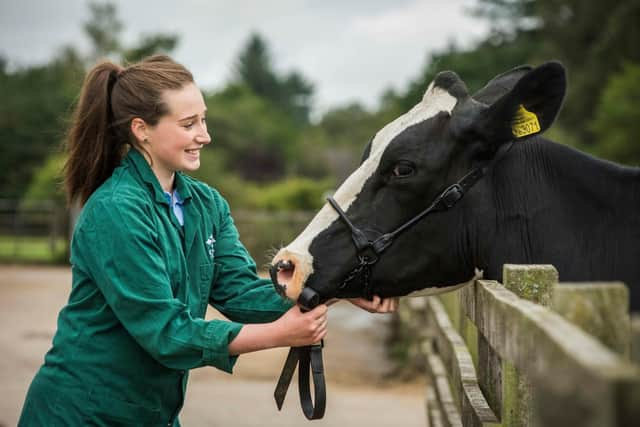Scotland to get first new vet school in 150 years
The establishment will be based in Aberdeen but will also have outposts across the country.
Founded by Scotland’s Rural College (SRUC), it will offer courses in veterinary medicine ranging from Higher National Diploma to postgraduate degree level.
Advertisement
Hide AdAdvertisement
Hide AdIt will also be Scotland’s first ever vet school based outside of Edinburgh or Glasgow.
The aim of the new facility is to widen access to training and address existing shortage areas in veterinary practice.
A report on the plan, by BiGGAR Economics, has found that the vet school could bring economic benefits worth £26 million and 242 jobs to Scotland by 2030.
SRUC has more animal and veterinary scientists than almost any other institution in Europe, plus a national network of veterinary hubs and consulting offices, providing a solid basis for a distributed model of learning.
The college is already the biggest provider of veterinary nursing, livestock husbandry and animal care training in Scotland.


New offerings will include a core programme to address demand in areas such as rural veterinary practice, food production, food safety and animal and public health.
The school will aim to widen participation using work-based teaching to align student recruitment and employability in shortage areas, which are essential to support Scotland’s important rural and food sectors.
A working group, chaired by Professor Sir Pete Downes, former principal and vice-chancellor of the University of Dundee, will be established to progress the plans for the school.
Advertisement
Hide AdAdvertisement
Hide AdIt will also include Sheila Voas, chief veterinary officer for Scotland, former NFUS president Nigel Miller, SRUC board member Jane Craigie and Dr Kate Richards, junior vice president of the Royal College of Veterinary Surgeons (RCVS) – due to become president in July.
Professor Caroline Argo, dean of SRUC’s North Faculty, will lead the project for SRUC.
Other working group members will be announced in due course.
Professor Wayne Powell, principal and chief executive of SRUC, said: “We are an ambitious institution with a bold vision for the future.
“This is a ground-breaking model to expand access to educational opportunities and broaden the range of potential students who would not ordinarily be able to attend a vet school.
“It will also help solve existing skills shortages across Scotland.
“We see a key role of the new vet school in sustaining primary agriculture and, hence, food and drink productivity, with the welfare of both livestock and companion animals at its heart.
“The school will produce champions for best-in-class animal welfare in support of these industries, which will help improve productivity, effectiveness and sustainability.
Advertisement
Hide AdAdvertisement
Hide Ad“Building on the excellent new facilities we have already announced for Aberdeen and Inverness, there is a lot of work still to be done, but we are ready to seize the opportunity.”
Linda Prescott-Clements, director of education at RCVS, added: “The RCVS looks forward to working with the team at SRUC as it moves towards meeting our accreditation standards, so that its future graduates can join the UK veterinary profession.”
A message from the Editor:
Thank you for reading this article. We’re more reliant on your support than ever as the shift in consumer habits brought about by coronavirus impacts our advertisers.
If you haven’t already, please consider supporting our trusted, fact-checked journalism by taking out a digital subscription.
Comments
Want to join the conversation? Please or to comment on this article.
